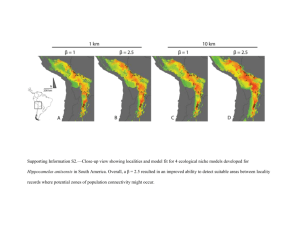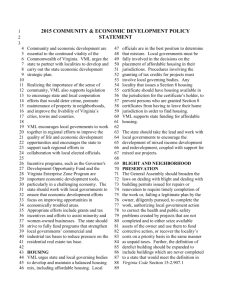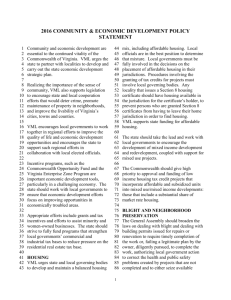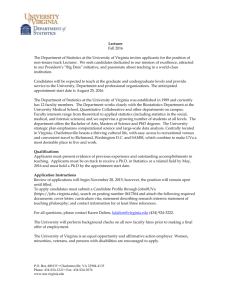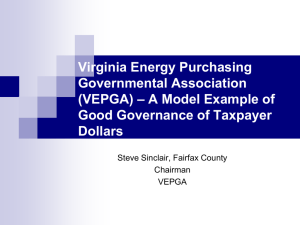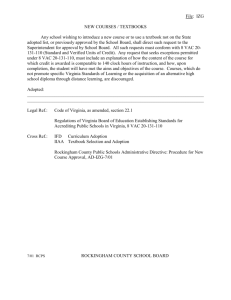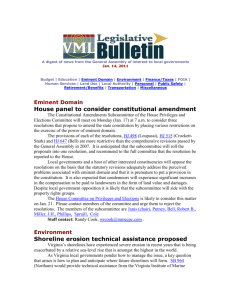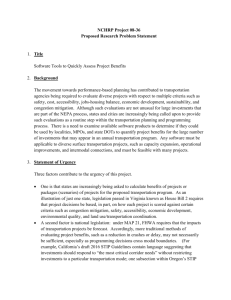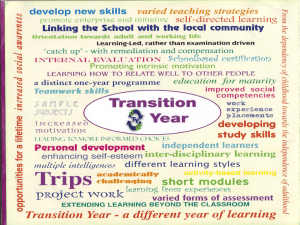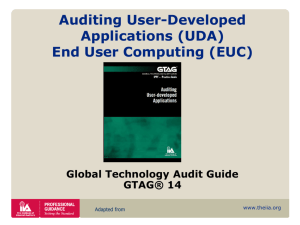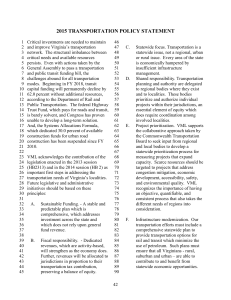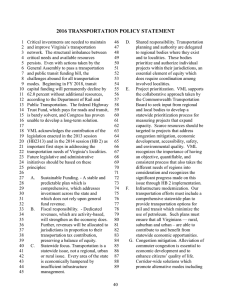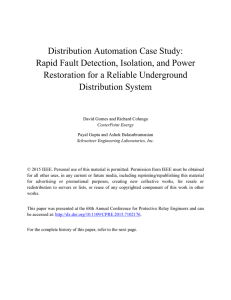Feb 9, 2011 edition
advertisement
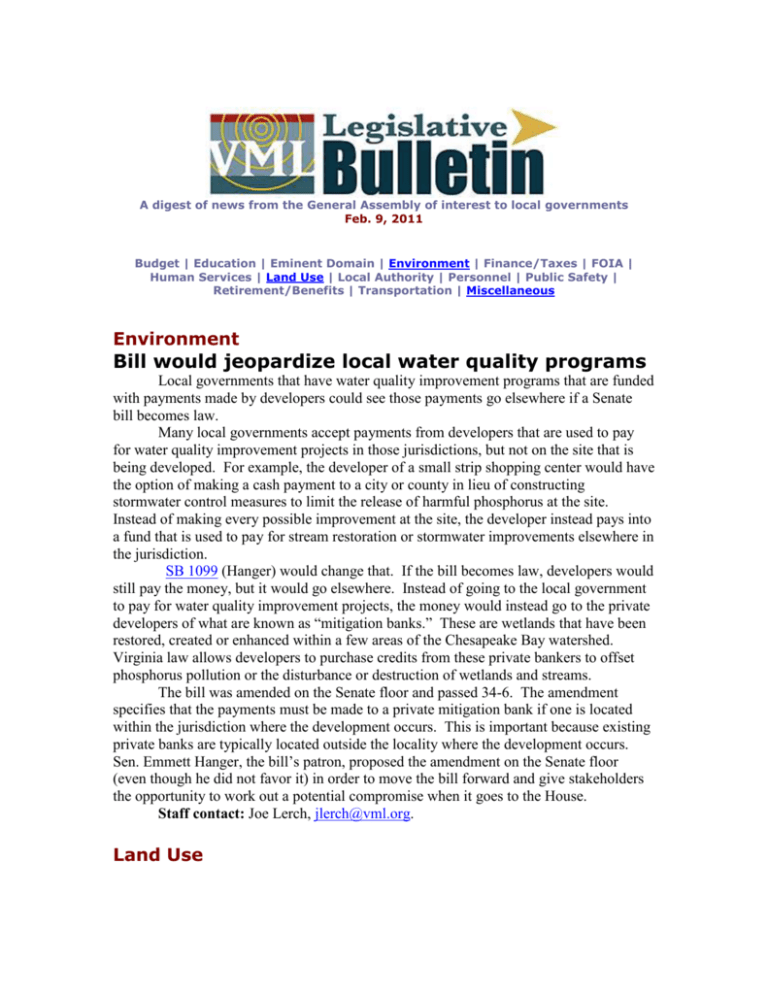
A digest of news from the General Assembly of interest to local governments Feb. 9, 2011 Budget | Education | Eminent Domain | Environment | Finance/Taxes | FOIA | Human Services | Land Use | Local Authority | Personnel | Public Safety | Retirement/Benefits | Transportation | Miscellaneous Environment Bill would jeopardize local water quality programs Local governments that have water quality improvement programs that are funded with payments made by developers could see those payments go elsewhere if a Senate bill becomes law. Many local governments accept payments from developers that are used to pay for water quality improvement projects in those jurisdictions, but not on the site that is being developed. For example, the developer of a small strip shopping center would have the option of making a cash payment to a city or county in lieu of constructing stormwater control measures to limit the release of harmful phosphorus at the site. Instead of making every possible improvement at the site, the developer instead pays into a fund that is used to pay for stream restoration or stormwater improvements elsewhere in the jurisdiction. SB 1099 (Hanger) would change that. If the bill becomes law, developers would still pay the money, but it would go elsewhere. Instead of going to the local government to pay for water quality improvement projects, the money would instead go to the private developers of what are known as “mitigation banks.” These are wetlands that have been restored, created or enhanced within a few areas of the Chesapeake Bay watershed. Virginia law allows developers to purchase credits from these private bankers to offset phosphorus pollution or the disturbance or destruction of wetlands and streams. The bill was amended on the Senate floor and passed 34-6. The amendment specifies that the payments must be made to a private mitigation bank if one is located within the jurisdiction where the development occurs. This is important because existing private banks are typically located outside the locality where the development occurs. Sen. Emmett Hanger, the bill’s patron, proposed the amendment on the Senate floor (even though he did not favor it) in order to move the bill forward and give stakeholders the opportunity to work out a potential compromise when it goes to the House. Staff contact: Joe Lerch, jlerch@vml.org. Land Use Bill advances that would make Urban Development Areas optional The House voted 61-38 on Tuesday in favor of a bill that would convert the fouryear-old mandatory Urban Development Areas law to a local option. Currently, if a locality has a significant growth rate, it is required to establish one or more UDAs in its comprehensive plan. If the UDA provision applies, the locality must amend its comprehensive plan to identify areas near commercial services and public facilities to accommodate all of the anticipated residential growth in the county, city or town for at least the next 10 years. UDAs are required to provide for high-density residential land development. HB 1721 (R. Marshall) states that any locality with the growth rate that triggers the UDA requirement – and which has not included UDAs to date – must only consider whether to enact UDAs. The locality would be authorized to reject UDAs. For localities that have adopted a UDA, they may revoke the adoption. On the House floor, Del. Clay Athey, the father of the original UDA law, successfully pushed an amendment to require any locality to hold a public hearing on whether it should continue to have zoning when it updates or enacts a comprehensive plan. This amendment applies only to the localities subject to the current UDA law. The bill, as amended, appears to require a public hearing on continuing to have zoning every time a comprehensive plan is amended in one of these localities. The bill’s next stop will be the Senate Local Government Committee. It is likely to receive a less warm welcome there. The legislation is being promoted heavily by members of the Tea Party and other groups. During the House Counties, Cities and Towns Committee hearing on HB 1721, one citizen testified that the bill was being promoted to stymie the United Nation’s effort to mold growth in Virginia. VML does not support the bill. In many cases, if counties are required to enact UDAs, the town or city in the county is likely to become all or part of the UDA. The original legislation was designed to promote sustainable growth. Staff contact: Mark Flynn, mflynn@vml.org. Miscellaneous Sovereign immunity challenges blunted Two bills designed to end the use of sovereign immunity by local governments were turned back this week. HB 2452 (Alexander) was a direct attempt to end the doctrine of sovereign immunity by placing local governments under the Virginia Tort Claims Act. Had localities been pushed into the act, sovereign immunity would have been removed as a defense for cities, towns and counties. The bill was left in a House Courts of Justice subcommittee. HJ 510 (Knight) asked the Joint Legislative Audit Review Commission to study sovereign immunity. The study likely would have resulted in another attempt to do away with the doctrine as it applies to local governments next session. The patron struck the bill prior to a subcommittee hearing. Staff contact: Randy Cook, wrcook@mmecpc.com. Rally for additional school funding set for Monday Education advocates will rally at the Bell Tower on the Capitol grounds on Monday (Feb. 14) in support of increased state funding for K-12 education. The rally will begin at 4:30 p.m. Sponsoring organizations include the Virginia Association of School Superintendents, Virginia Education Association, Virginia First Cities, Virginia Parent Teachers Association, Virginia School Boards Association, Virginia Association of Counties and VML. State education funding in the current year is lower on a dollar basis and a per pupil basis than in FY07. Despite the reductions in funding, state standards have continued to be raised and federal No Child Left Behind requirements continue to be ratcheted up. The General Assembly is continuing to pile on new mandates on school divisions this year, even in the wake of continued state funding reductions. Gov. Bob McDonnell’s budget amendments actually cut state funding for public education despite the availability of at least $400 million in new state dollars. The House of Delegates budget proposes further reductions in K-12 education, while the Senate budget proposes about $100 million in money to begin to “repair the damage” done to public education over the last three years. The focus of the rally will be to urge increased state funding for education and support for the state to live up to its constitutional responsibilities for funding local schools. Local officials are urged to attend the rally on Monday and to encourage others in their home communities to participate. Also, you should take this opportunity to visit your local delegate and senator. Staff contact: Mary Jo Fields, mfields@vml.org.
